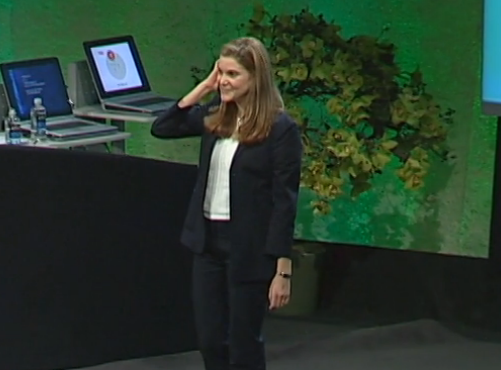Thank you. It's really an honor and a privilege to be here spending my last day as a teenager.
谢谢各位!非常荣幸能够站在这里,与大家分享我19岁的最后一天。
So today I want to talk to you about the future, but first I'm going to tell you a bit about the past.
今天我想跟大家谈谈未来,但是首先我要用一点时间讲讲我过去的经历。
My story starts way before I was born. My grandmother was on a train to Auschwitz, the death camp.
这个故事要从我出生之前讲起,我的外祖母曾经在开往死亡集中营奥斯维辛的一辆火车上。
She was going along the tracks, and the tracks split.
火车顺着轨道开呀开,开到一个轨道分叉处。
And somehow -- we don't really know exactly the whole story -- but the train took the wrong track and went to a work camp rather than the death camp.
然后不知怎么地——没人知道倒底怎么回事——总之,火车开上了错误的轨道,开到了一处劳动集中营,而不是奥斯维辛。
My grandmother survived and married my grandfather. They were living in Hungary, and my mother was born.
我的外祖母就这样幸免于难,然后嫁给了我的外祖父,他们住在匈牙利时,生下了我母亲。

And when my mother was two years old, the Hungarian revolution was raging, and they decided to escape Hungary.
我母亲两岁的时候,匈牙利革命爆发,于是外祖父母决定离开匈牙利。
And they got on a boat, and yet another divergence -- the boat was either going to Canada or to Australia.
他们上了一条船,又一次的阴差阳错,这条船可能开往加拿大或者是澳大利亚。
They got on and didn't know where they were going, and ended up in Canada. So, to make a long story short, they came to Canada.
他们上船的时候并不知道会到哪里,最后船把他们送去了加拿大。嗯,长话短说,他们到了加拿大。
My grandmother was a chemist. She worked at the Banting Institute in Toronto, and at 44 she died of stomach cancer.
我的外祖母是一名化学家,她在多伦多的班廷研究所工作,44岁时死于胃癌。
I never met my grandmother, but I carry on her name -- her exact name, Eva Vertes -- and I like to think I carry on her scientific passion, too.
所以我并没有机会亲眼见到她,但是我继承了她的名字——伊娃·韦尔泰什,我想我也继承了她对科学的热情。












